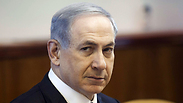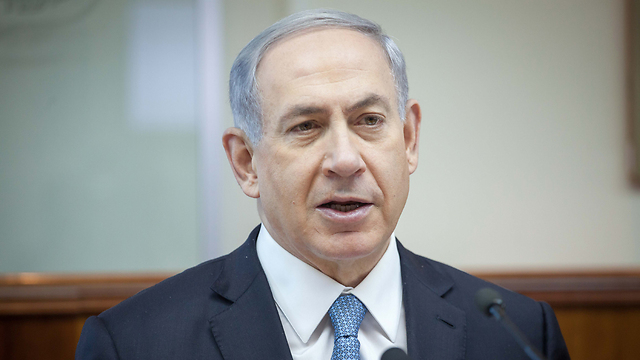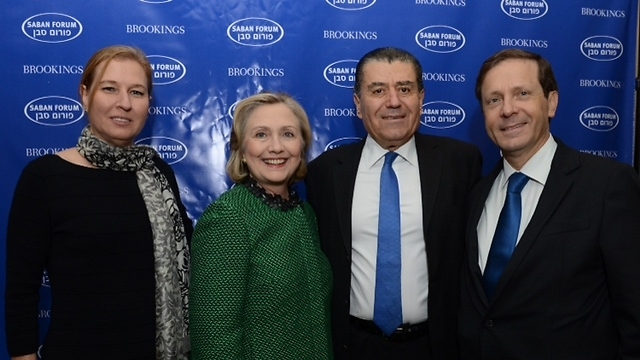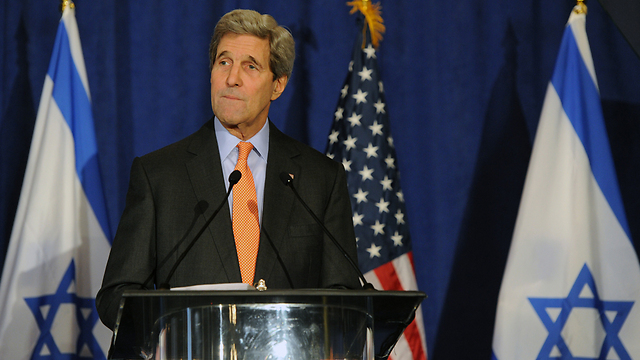
Netanyahu: No peace without real security
Israeli prime minister tells DC elite that Palestinians chose to end peace process by making pact with Hamas, claims Israel helped prevent 'bad deal' with Iran.
The Israeli leader began his remarks by focusing on his favored foreign policy agenda – Tehran's nuclear ambitions. "A deal was not signed last month that would have effectively left Iran as a threshold-nuclear power. (We) played a significant role in stopping a bad deal."
Pivoting to the Middle East issue dominating news cycles across the world, Netanyahu repeated his warnings over radical Islam's gathering influence. "Where once seemingly coherent nations and defined borders stood, we now see the entire region hemorrhaging."
But the Likud leader, facing mounting tensions with Palestinians in East Jerusalem and an electoral challenge from within his fractured coalition, said "Israel and our moderate Arab neighbors have much to gain" from cooperation.
Netanyahu then returned to the Israeli-Palestinian conflict to emphasize that security was a precondition of any comprehensive peace deal and blamed Palestinian leader Mahmoud Abbas for the failure of the latest round of negotiations.
"The talks ended because the Palestinians wanted them to, because Abbas chose a pact with Hamas over talks with Israel," Netanyahu claimed, and stressed that there was "no peace without real security. No real security, without a long-term IDF presence to provide it."
Netanyahu dismissed criticism of Israeli construction in Jewish neighborhoods, saying "the tragic attack on Har Nof synagogue was not focused on how many apartments Jews were building in Jerusalem. Abbas remains in a political pact with those who celebrated the murder of rabbis, three of which were American citizens."
The Israeli leader then presented his "three pillars of peace" that could serve as a platform to end the conflict: Genuine mutual recognition, end to all claims including right of return, and long-term Israeli security."
He added: "My friends, Israel seeks peace, but we need a Palestinian partner who will stand up to Palestinian extremists. I hope we find such a partner."
Netanyahu's comments came as Secretary of State John Kerry cited movement in the nuclear negotiations with Iran and urged patience while vowing that the process would not continue without "tangible progress."
In his remarks, which followed Netanyahu's taped speech, Kerry acknowledged differences between Israel and the United States on how to approach Iran but stressed that the two countries' goals are the same.
"While we may disagree on tactics from time to time, when it comes to the core strategic goal - no nuclear weapon - there is not an inch of daylight between the United States and the State of Israel," he said.
Kerry maintained that the interim nuclear accord with Iran is holding and that fears that the Iranians would cheat have proven to be unfounded thus far. He said new ideas on how to achieve a more durable agreement have been presented and that it was his hope that the late March target for a framework would be met with little need for further negotiation.
"We have no intention of negotiating forever," Kerry said. "Absent measurable progress, who knows how much longer this could go on."
But, he also stressed the importance of sealing a deal that keeps Iran from having nuclear weapons.
"If we succeed in reaching an agreement, the entire world, including Israel, will be safer for it," he said.
Kerry, who invested considerable time and energy in an unsuccessful attempt to broker an Israeli-Palestinian peace agreement, said he believed that redefining strategic interests among states throughout the Middle East could lay the groundwork for a resumption in talks.
He lamented, however, that conditions are not yet ripe for new peace negotiations, particularly due to heightened tensions between Israel and the Palestinians that have led to an unprecedented amount of frustration. And Kerry once again denounced continued Israeli settlement activity as "undermining the prospects for peace."
Another wild card, he said, are Israel's upcoming elections.
The 11th annual Saban Forum, held by the Brookings Institute, hosted a number of key dignitaries and officials from both sides of the "special alliance", including former secretary of state Hillary Clinton, Vice President Joe Biden, former justice minister Tzipi Livni, and Economy Minister Naftali Bennett.
The conference held under the banner of "Stormy Seas: The United States and Israel in a Tumultuous Middle East" has given Israeli officials – past and present – the opportunity to share their opinions of the upcoming elections, to be held in March.
"I will be the next prime minister and I call on Tzipi Livni and Hatnua to join me," Herzog said in a conversation with Israeli reporters at the sidelines of the forum.
"Sure, as long as there's another prime minister," Livni, standing next to him, responded with a smile.
Former US secretary of state Hillary Clinton was the first to speak at the Saban Forum's 11th annual conference. She took the opportunity to stress that the American administration will continue aiding Israel, regardless of who was prime minister.
She stressed that "there is a necessary imperative to continue to try to achieve a resolution between Israel and the Palestinians. The two state solution … remains an important and, I would argue, essential concept to bring people together around."
Current Secretary of State John Kerry, who has played a significant role in pushing Israelis and Palestinians towards a negotiated settlement of the ongoing conflict, will also address the convention later on Sunday.













